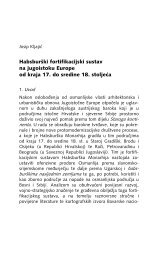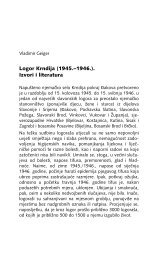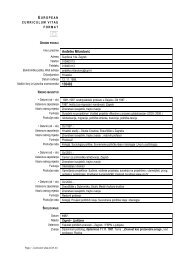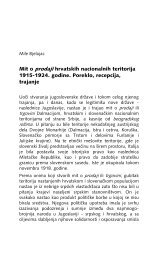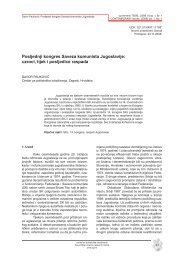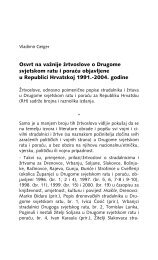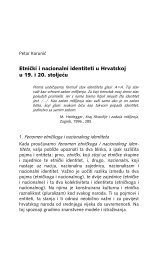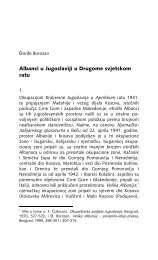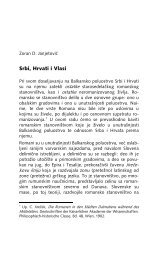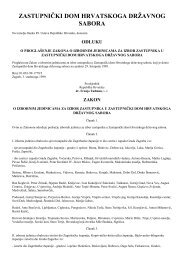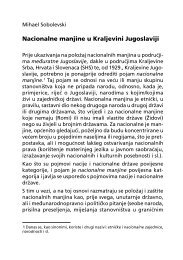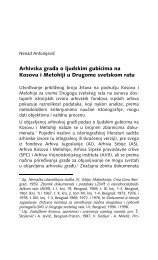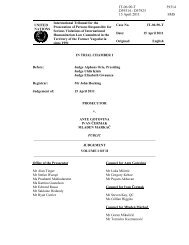ISSN 1847-2397 godište II broj 1 2009. | volume II number 1 2009
ISSN 1847-2397 godište II broj 1 2009. | volume II number 1 2009
ISSN 1847-2397 godište II broj 1 2009. | volume II number 1 2009
- No tags were found...
You also want an ePaper? Increase the reach of your titles
YUMPU automatically turns print PDFs into web optimized ePapers that Google loves.
Maja Sahadžić: The Electoral System of Bosnia and Herzegovinasuvremene TEME, (<strong><strong>2009</strong>.</strong>) God. 2, Br. 1CONTEMPORARY issues, (<strong>2009</strong>) Vol. 2, No. 1a party, but also for a candidate on that specificparty list which became a norm in latter ElectoralLaw of Bosnia and Herzegovina. “However, thissystem does not take into account the uniquenessof a society divided along ethnic lines.Open lists might increase accountability but donot necessarily favour moderation. Nor do theypromote multiethnicity and multi – ethnic parties– both explicit goals that the Electoral Lawwas supposed to achieve” (Belloni, 2004: 340).On the other side multi – member constituenciesat 2000 elections were effectuated for theParliament of the Federation of Bosnia and Herzegovinaand the National Assembly of the Republicof Srpska elections. But, there were someflaws. “While sensible in theory, to improve accountability,in practice its impact on fosteringinter–ethnic moderation is small. Indeed, theway the MMCs [multi–member constituencies]were drawn up (preserving a clear ethnic majoritywithin each constituency) made it unlikelythat candidates would seek support across ethniclines. Furthermore, the sheer complexity ofthe system was likely to be difficult for votersto understand, and thus discourage electoralparticipation. Finally, compensatory mandatesincrease the <strong>number</strong> of parties represented inparliament, encouraging political fragmentationat the expense of stable government (…)” (Belloni,2004: 340-341). In the Republic of Srpskapreferential voting was accepted for the electionof the President and Vice – President of the Republicof Srpska. “Nevertheless, preferential votingfor the RS Presidency was unlikely to be areliable test for at least for two reasons. First,this system is unlikely to produce conciliatory behaviorwhere ethnic groups are concentrated inparticular geographic regions. In these instances,the politicians’ incentive to seek support fromvarious groups depends on the presence andsize of minority groups. Because the RS electoratewas not ethnically heterogeneous, onlyunder the most unusual circumstances couldAV [alternative votes/voting] have influenced theresults” (Belloni, 2004: 342). House of Peoplesof the Parliament of Federation was about to beelected through Cantonal Assemblies in a mannerthat member of different community can votefor each other and not by the same communityelected members. This rule was known as a BarryRule 16 . “The main Croat nationalist party, theCroatian Democratic Union (HDZ) objected vigorously.It argued that when all members of the16 US Ambassador Robert Barry, who imposed this rule,was appointed Head of the OSCE Mission to Bosnia andHerzegovina from 1998-2001Canton Assembly elected the delegates in oneelection, there would be an influence of the majoritygroup – the Bosniaks – on the selection ofthe delegates from the smaller groups. The HDZbegan its 2001 rebellion against internationalpolicy as a protest against the Barry Rule, leadingto a major confrontation between the partyand international peacebuilders” (Belloni, 2004:343). This does not downgrade the fact that bythis very Rule Bosniaks intrinsically influencedCroat member’s conformation in the House ofPeoples of the Federation of Bosnia and Herzegovina,and thereby political and legal dimensionsof Bosniak-Croat relation concernment inthe Federation of Bosnia and Herzegovina.In 2002, the Bosnian and Herzegovinianelectoral commission, rather than the OSCE,organized general elections for the first time autonomouslywithout major problems. Electionsfor municipal councils, mayors and the Districtof Brčko were held without significant incidentsin October 2004. For the first time, mayors weredirectly elected in the country, as was a unifiedcity council in previously divided Mostar. Someincidents of fraud, nevertheless, have occurred.As the OSCE notes, the electoral system is verycomplex and often not understood by voters. Thegovernment has the power to govern in principle,but its ability to govern is constrained by the continuedintervention of the Office of High Representativein Bosnia and Herzegovina (OHR), thefragmentation of public authority in the entitiesand regions, as well as the extensive veto rightsat state and entity level (Bieber, 2006: 43-64).5. Permanent Electoral System in Bosnia andHerzegovinaIn 2001 Parliamentary Assembly of Bosniaand Herzegovina adopted Electoral Law ofBosnia and Herzegovina. “The draft ElectoralLaw was prepared by international OSCE staffand legitimized firstly as national project throughthe involvement of the seven-strong IndependentExperts Commission appointed by the HR(High Representative) and, secondly, as an internationallysanctioned document through theapproving comments of the Council of Europe’sVenice Commission. The EL (Electoral Law)took long time to pass through Parliamentary Assemblyof Bosnia and Herzegovina. One of themain reasons was that the OSCE meant for itto clearly favor in the electoral competition non– nationalist parties that have multiethnic leadershipand membership, that respect the GFAPcentar za politološka istraživanjathe political science research centrewww.cpi.hr67



